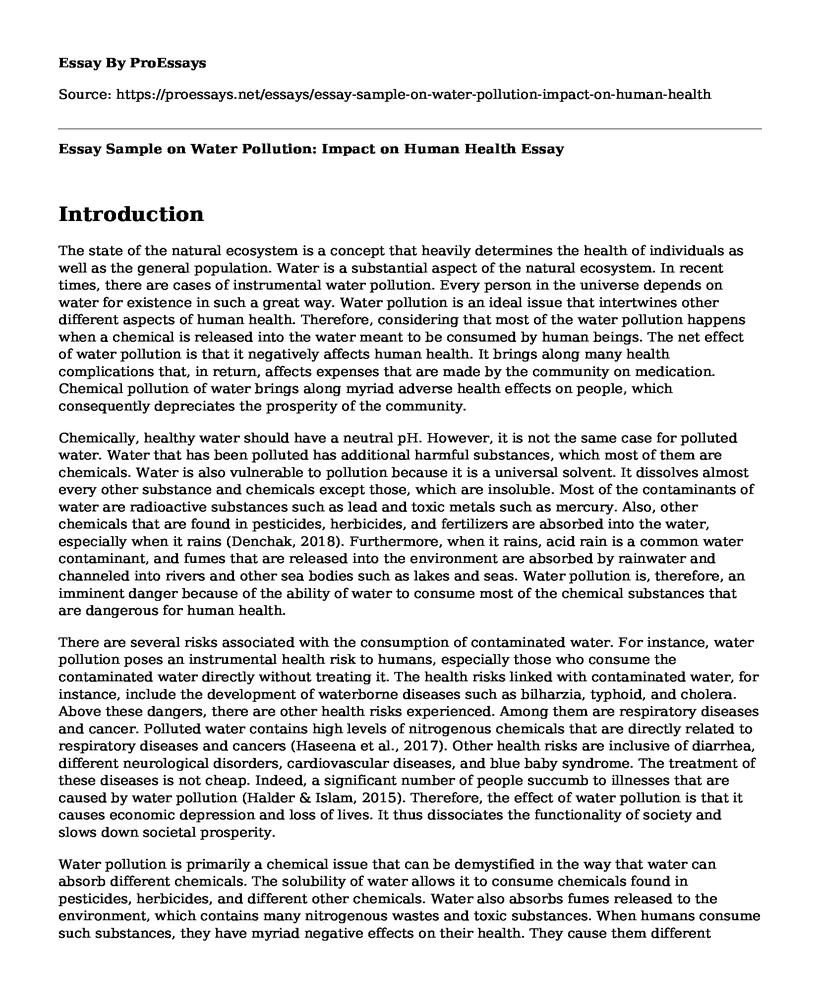Introduction
The state of the natural ecosystem is a concept that heavily determines the health of individuals as well as the general population. Water is a substantial aspect of the natural ecosystem. In recent times, there are cases of instrumental water pollution. Every person in the universe depends on water for existence in such a great way. Water pollution is an ideal issue that intertwines other different aspects of human health. Therefore, considering that most of the water pollution happens when a chemical is released into the water meant to be consumed by human beings. The net effect of water pollution is that it negatively affects human health. It brings along many health complications that, in return, affects expenses that are made by the community on medication. Chemical pollution of water brings along myriad adverse health effects on people, which consequently depreciates the prosperity of the community.
Chemically, healthy water should have a neutral pH. However, it is not the same case for polluted water. Water that has been polluted has additional harmful substances, which most of them are chemicals. Water is also vulnerable to pollution because it is a universal solvent. It dissolves almost every other substance and chemicals except those, which are insoluble. Most of the contaminants of water are radioactive substances such as lead and toxic metals such as mercury. Also, other chemicals that are found in pesticides, herbicides, and fertilizers are absorbed into the water, especially when it rains (Denchak, 2018). Furthermore, when it rains, acid rain is a common water contaminant, and fumes that are released into the environment are absorbed by rainwater and channeled into rivers and other sea bodies such as lakes and seas. Water pollution is, therefore, an imminent danger because of the ability of water to consume most of the chemical substances that are dangerous for human health.
There are several risks associated with the consumption of contaminated water. For instance, water pollution poses an instrumental health risk to humans, especially those who consume the contaminated water directly without treating it. The health risks linked with contaminated water, for instance, include the development of waterborne diseases such as bilharzia, typhoid, and cholera. Above these dangers, there are other health risks experienced. Among them are respiratory diseases and cancer. Polluted water contains high levels of nitrogenous chemicals that are directly related to respiratory diseases and cancers (Haseena et al., 2017). Other health risks are inclusive of diarrhea, different neurological disorders, cardiovascular diseases, and blue baby syndrome. The treatment of these diseases is not cheap. Indeed, a significant number of people succumb to illnesses that are caused by water pollution (Halder & Islam, 2015). Therefore, the effect of water pollution is that it causes economic depression and loss of lives. It thus dissociates the functionality of society and slows down societal prosperity.
Water pollution is primarily a chemical issue that can be demystified in the way that water can absorb different chemicals. The solubility of water allows it to consume chemicals found in pesticides, herbicides, and different other chemicals. Water also absorbs fumes released to the environment, which contains many nitrogenous wastes and toxic substances. When humans consume such substances, they have myriad negative effects on their health. They cause them different ailments, which are inclusive of diarrhea, cancer, waterborne, and respiratory diseases. Most of these diseases are costly to treat, hard to manage, and are reported to be leading causes of deaths. Therefore, water pollution is such a great chemical concern that shows how disruption of the ecosystem negatively affects human health and the prosperity of the community at large.
References
Denchak, M. (2018, March 14). Water Pollution: Everything You Need to Know. Retrieved from https://www.nrdc.org/stories/water-pollution-everything-you-need-know
Halder, J. N., & Islam, M. N. (2015). Water pollution and its impact on the human health. Journal of environment and human, 2(1), 36-46. Retrieved from https://doi.org/10.15764/EH.2015.01005
Haseena, M., Malik, M. F., Javed, A., Arshad, S., Asif, N., Zulfiqar, S., & Hanif, J. (2017). Water pollution and human health. Environmental Risk Assessment and Remediation, 1(3), 16-19. DOI: 10.4066/2529-8046.100020
Cite this page
Essay Sample on Water Pollution: Impact on Human Health. (2023, Mar 04). Retrieved from https://proessays.net/essays/essay-sample-on-water-pollution-impact-on-human-health
If you are the original author of this essay and no longer wish to have it published on the ProEssays website, please click below to request its removal:
- Research Paper Sample on Organic Photovoltaic Devices - a Renewable Energy Source
- Essay on Preventing Climate Change
- Hazed and Confused: The Effect of Air Pollution on Dementia
- Essay Sample on Zero Waste Management
- Essay Example on Industrial Pollution: A Business Problem Facing Manufacturing Industries
- Environmental Health: Assessing Human Health and Disease Risk From Climate and Built Environments - Essay Sample
- Essay Example on Rising Sea Levels due to Climate Change







